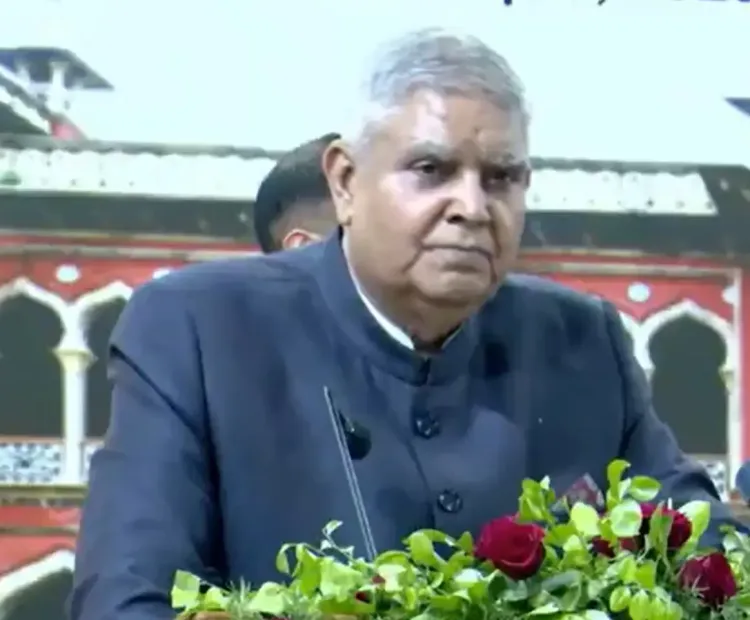How can Agricultural Universities Drive Farmers’ Prosperity?

Synopsis
Key Takeaways
- Farmers need to transition from producers to entrepreneurs.
- Collaboration is key among all agricultural stakeholders.
- Research can significantly enhance farmers' profitability.
- Awareness of government initiatives is essential.
- Empowering farmers will create a robust agricultural ecosystem.
Coimbatore, April 27 (NationPress) Vice President Jagdeep Dhankhar emphasized on Sunday that India's agricultural universities play an essential role in transforming farmers from simple producers into thriving entrepreneurs. Speaking to students at the Tamil Nadu Agricultural University, Dhankhar noted that previously, the focus was on food security, but now it's time to shift towards farmer prosperity.
He stated, “Farmers must achieve prosperity, and this evolution should originate from institutions like yours.”
Dhankhar encouraged students to close the gap between research and practical farming. “There should be a seamless connection between lab and land,” he insisted. He pointed out that over 730 Krishi Vigyan Kendras should serve as lively hubs for farmer interaction and education. “You must act as a vital link to these Krishi Vigyan Kendras,” he urged, while also mentioning the Indian Council of Agricultural Research, which comprises over 150 institutions dedicated to various agronomy aspects.
He called for collective efforts from all stakeholders to align agricultural university curricula with the goal of transforming farmers into entrepreneurs. “It is crucial to motivate farmers to see beyond mere production,” he remarked, suggesting the introduction of both formal and informal courses that would attract farmers and their children to become marketeers and value-adders in agriculture. “Your institutions have the potential to be catalysts for change within our agro-farming sector,” he added.
Dhankhar highlighted the necessity for research aimed at converting perishable items like tomatoes into shelf-stable, high-quality products, which can significantly enhance farmers' profitability. “Such initiatives can revolutionize agri-entrepreneurship,” he explained.
He pointed out the existence of 6,000 agri-startups, but emphasized that this number is inadequate for a nation of 1.4 billion, which includes 100 million farming families. He reiterated the importance of raising awareness regarding government initiatives, such as Farmer Producer Organizations (FPO), and mentioned a budget allocation of Rs one lakh crore aimed at bolstering farmer infrastructure.
Dhankhar stressed the need to empower farmers through awareness campaigns that highlight the strength of the government cooperative system. “This will pave the way for the emergence of ‘farmer entrepreneurs,’ which is essential at this juncture,” he stated.
He urged students to play a vital role in shifting the mindset of farmers from being mere producers to value-adders by initiating industries based on their own produce.
Additionally, he showcased the advances in India’s agricultural sector, noting that agri-food products now account for over 11 percent of the nation’s total exports.










